Ukrainian refugees give back to 'second home' centre
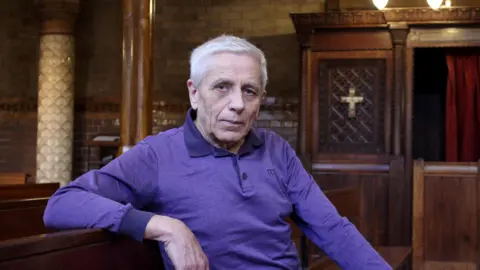 BBC
BBCAlmost 220,000 Ukrainian refugees arrived in the UK up to December 2024 through two dedicated schemes set up after Russia's invasion of Ukraine in 2022, with 17% of them initially arriving in London.
Among them was Igor, a children's fiction writer from Kyiv, who recalled how lost he felt when he first arrived in the capital.
"Imagine, you move to London, with one bag and no knowledge of English. It was incredibly difficult," he said, but added since he set foot in the Ukrainian Welcome Centre in central London he "didn't want to go anywhere else".
The charity has helped thousands of Ukrainians forge new lives in the UK from its base in the Ukrainian Catholic Cathedral just off Bond Street.
The centre has provided a lifeline and sanctuary for many Ukrainian refugees, not just Igor, providing immediate support as they navigated Biometric Residence Permits, GPs and school curriculums.
Run by volunteers and supported entirely by donations - including English textbooks, computers, and even a kiln for clay sculpting classes - the centre was operational within weeks of the full-scale invasion.
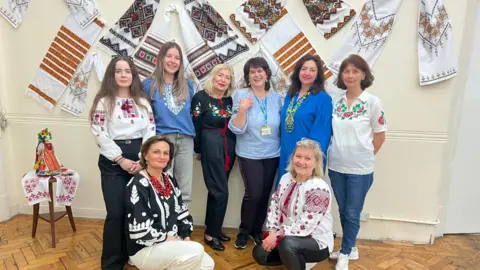 Ukrainian Welcome Centre
Ukrainian Welcome CentreAfter benefitting from immigration advice and English language classes Igor has become a volunteer himself, leading children's sessions and the centre's "Ukrainian gatherings", where the community come together to discuss both Ukrainian and British history and culture.
For Igor, "the centre is a second home - or now, perhaps even my first".
"This isn't just a centre, it's a family," he said.
Inna, another centre user turned volunteer, described her awe at the breadth of support available.
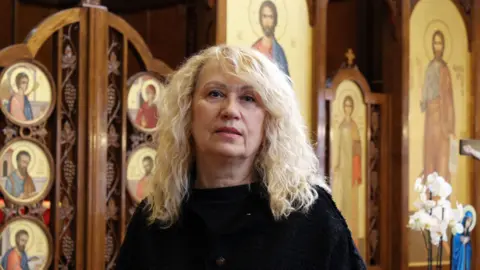
With such a vast network "everything can be resolved" and nobody is turned away, she said.
As a receptionist for the centre, she has helped those who arrive "wide-eyed" and "confused" as she once was.
Becoming a volunteer, she said, had boosted her self-esteem and allowed her to give back to the place she could not imagine surviving without.
Centre co-founder Bishop Kenneth Nowakowski, a fifth-generation Ukrainian-Canadian from the Ukrainian Catholic Cathedral, said he still remembered the early hours of 24 February 2022 "as if it was this morning".
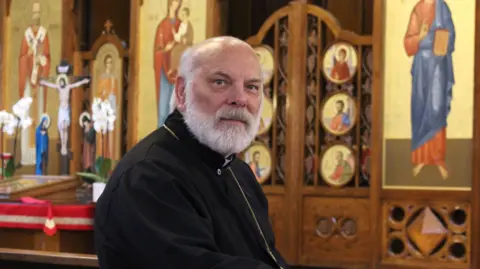
He said after he woke up in the early hours to a flood of phone notifications, he "thought somebody was sending me some kind of fake news that Ukraine is being invaded".
It was only when he turned on BBC News and saw bombs falling on Kyiv that his disbelief quickly turned into action.
The Ukrainian community gathered in his cathedral, where the idea for the centre was mapped out among the pews.
Together with the Association of Ukrainians in Great Britain, the cathedral transformed its basement into a one-stop facility providing virtual and online services to Ukrainians arriving in the UK.
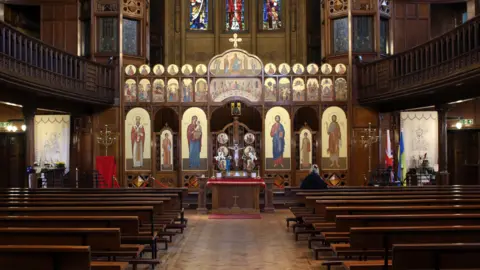
Since then it has welcomed thousands including King Charles, who officially opened the centre in November 2022 during a visit with Ukraine's First Lady, Olena Zelenska.
Andriy Marchenko, the centre's director, said it "started from scratch" and they "scarcely knew anything" but have now successfully helped people to "thrive, not just survive".
Teachers have come out of retirement to provide English language classes, Ukrainian-speaking lawyers and counsellors offer vital legal and mental health support, and until recently the Home Office visited the facility every fortnight, providing direct access to immigration advice.
But for every practical service there are just as many creative and wellbeing classes, from knitting and line dancing to "Tea and Talk" afternoons.
In the three years since the full-scale invasion, the refugees' needs have changed.
Those who once needed urgent help with visas now seek advice on careers and polish their English in advanced classes as their lives in the UK become less temporary with every year the war goes on.
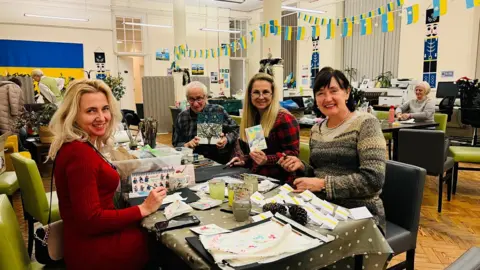 Ukrainian Welcome Centre
Ukrainian Welcome CentreBishop Kenneth has acknowledged that the warm welcome Ukrainians have received from the centre and the UK is a "double-edged sword", as many of those he meets express both deep gratitude alongside a longing to return home.
"The longer people remain here - children are going to school, people are planning their careers, their lives - it becomes more and more unlikely that they will be able to go back to Ukraine," said Bishop Kenneth.
Having recently been to eastern Ukraine, he paints a stark picture of what little is left.
"All of the schools, all of the houses, the hospitals, the infrastructure is so badly damaged. What can they go back to?"
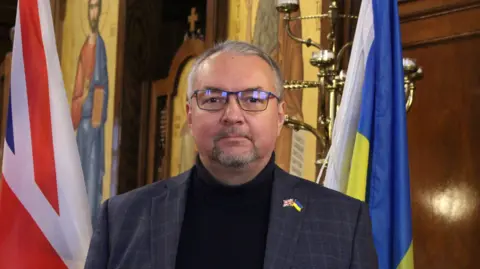
Mr Marchenko also said he never anticipated the centre would still be needed today.
He remembered how he was told in 2022 to stay strong because "the war might go on for six months".
"If we had this conversation two years ago, I would have bluntly said that I'm looking forward to losing my job, that the centre closed down because the war ended. Unfortunately, this is not the case," he added.
As the war goes on through its fourth year, Bishop Kenneth noted the bittersweet fact that "Zaporizhzhia, Kyiv and Lviv flow off everybody's tongue as if they were Manchester, Coventry and Bolton. Nobody has to show you on the map where Ukraine is".
Cross-hatched lines on that map continue to shift as different colours chart Ukrainian and Russian advances on the battlefield, while miles away, those at the Ukrainian Welcome Centre continue to put the kettle on and open the doors wide.
Listen to the best of BBC Radio London on Sounds and follow BBC London on Facebook, X and Instagram. Send your story ideas to [email protected]
